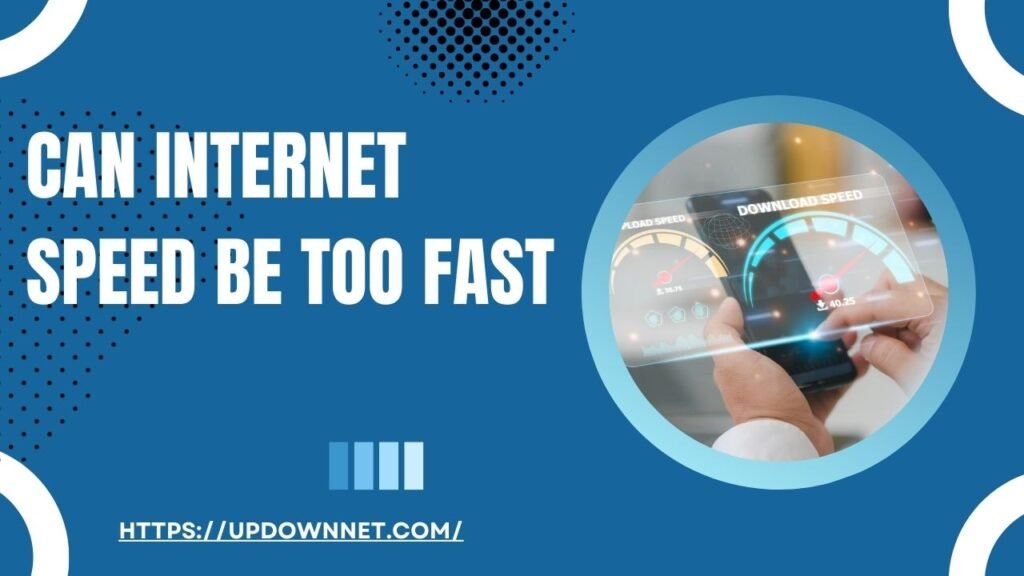Learn about Can Internet Speed Be Too Fast? Explore the unexpected downsides of lightning-fast Internet speeds. Discover the pros of high-speed connectivity. Find out if your Internet speed is appropriate.
Introduction
The speed at which data is transmitted between your device and the internet is referred to as Internet speed. Megabits per second (Mbps) is the standard measurement of internet speed. Higher Mbps will result in faster downloads, seamless streaming, and smooth browsing, resulting in faster downloads.

Can Internet Speed Be Too Fast?
Yes, internet speed can be excessive in certain circumstances. It may seem counterintuitive to wish for anything other than lightning-fast internet, but there are some circumstances in which an excessively fast internet connection may not be the best choice. We will examine when internet speed is excessive in more detail in the following manner:
1. Cost
A high-speed internet connection often comes at a premium price. There is no doubt that faster connections offer greater productivity and entertainment, however, they may not be cost-effective for everyone. There is a possibility that people who have modest Internet needs could end up paying for speeds that they do not fully utilize.
2. Compatibility
The majority of devices and applications are not capable of handling ultra-fast internet speeds. A computer, smartphone, or IoT device that is over ten years old may have difficulty keeping up. It is possible that this may even result in slower performance in some cases because of compatibility issues.
3. Security
The proliferation of cyber threats can also be accelerated by lightning-fast internet speeds. Viruses, malware, and hackers are able to take advantage of this speed advantage, making it essential to have robust security measures in place to ensure the system can remain secure.
4. Data Consumption
Streaming high-definition videos and downloading large files is more tempting when the internet is faster. There may be an increase in data consumption as a result of this, which may result in overage charges or in exceeding internet service provider data caps.
5. Dependency
The speed of the internet has increased over the years, and we are becoming increasingly reliant on it. The reliance on technology can create problems when it fails, causing disruptions in both our personal and professional lives.
6. Lack of Control
The ultra-fast internet may result in limited control for some users. It is common for service providers to manage network traffic and throttle certain applications or services, which may adversely affect the experience of users.
7. Environmental Impact
The maintenance of high-speed internet infrastructure requires a greater amount of energy and resources. There are potential environmental implications of this, especially in areas where a significant portion of the electricity is generated by non-renewable resources.
The Pros of Blazing Speeds
Here are the following pros:
- Effortless Streaming: A faster internet connection ensures seamless streaming of high-definition content. No more buffering interruptions during your favorite Netflix series or YouTube videos with a faster internet connection.
- Quick Downloads: It is possible to download large files, such as software updates, movies, and games within seconds. This is a boon for those who do not like to wait.
- Smooth Gaming: This technology allows gamers to play online games without experiencing lag, giving them a competitive advantage in virtual environments.
- Enhanced Productivity: The speed of a computer can make it easier to accomplish work, especially when dealing with large files, cloud-based applications, and video conferencing sessions.
When Too Much of a Good Thing Becomes a Problem?
1. Overkill for Basic Tasks:
An ultra-high-speed connection might be unnecessary if the majority of your online activities involve email, social media, and light browsing of the web. Since these activities do not require vast quantities of bandwidth, having an ultra-high-speed connection may be unnecessary.
2. Cost Considerations
You may be overspending if you are not making the most of your ultra-fast internet connection. If you are not maximizing your connection, you may incur additional charges.
3. Network Compatibility
The performance of some older devices and networks may be affected by lightning-fast connections, which may result in problems with compatibility.
4. Security Concerns
Faster internet speeds may result in you unintentionally downloading malware or malicious content more quickly than your antivirus software is able to detect it.

The Goldilocks Zone of Internet Speed
- Tailored to Needs: You should be able to obtain the perfect internet speed for your specific needs without being overwhelmed by excessive speeds.
- Considering Location: It is possible that rural areas do not require ultra-fast internet, whereas urban areas have a greater need for high-speed internet due to the density of the population.
- Environmental Consciousness: Reducing the environmental impact of your internet use can be accomplished by selecting eco-friendly internet providers and technologies.
How does compatibility mode affect a network?
It is recommended that compatibility mode be enabled so that managed devices cannot download or upload more than 100 MBP per second.
The compatibility mode limits the download and upload speeds of managed devices to 100 MBP/s when enabled. The download and upload speeds are still very fast.
Why does high-speed internet cost more?
The installation, equipment, and extra fees associated with an Internet plan may be in addition to the basic monthly fee.
The type of Internet connection you select and cable connections, for example, cost about the same (if not less) than slower connections like DSL. The cost of faster plans is higher, however.
Do I lose control with faster internet?
There are some service providers that use network traffic management and may throttling certain applications or services, which decreases the degree of control over the online experience that users have.
Conclusion
Fast internet speeds are generally considered a positive development, but excessively high speeds can also have disadvantages. There is the potential for an increase in energy consumption and environmental impact, as well as the risk of overwhelming the user’s device and infrastructure.
The key to achieving sustainability is striking a balance between speed and sustainability. Internet speed should be optimized to meet the needs of users while remaining efficient, reliable, and efficient without compromising other important factors as technology advances.




Pingback: Why Vi Net Speed is Slow? A Comprehensive Guide - It's All About Internet